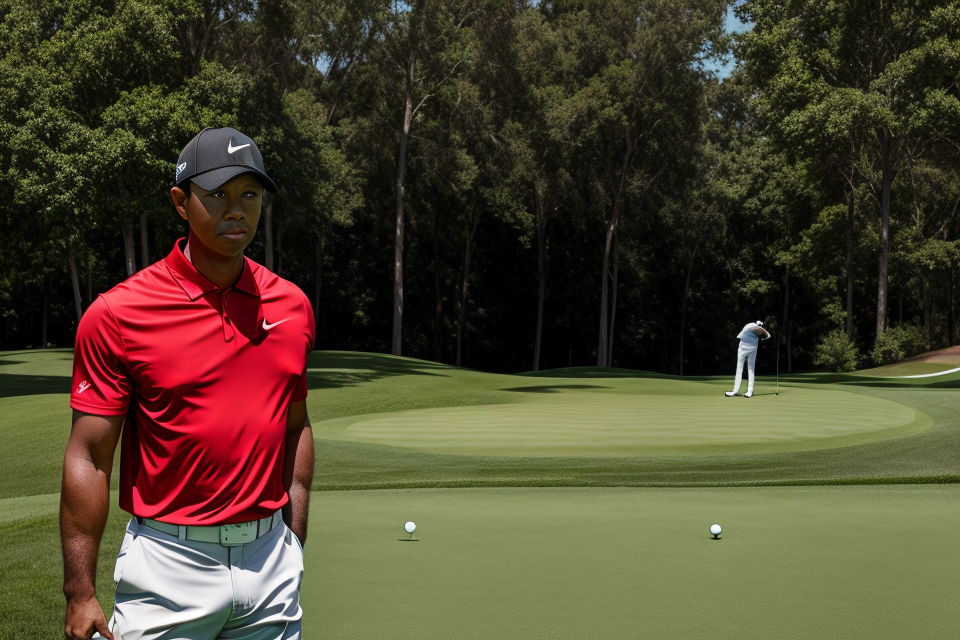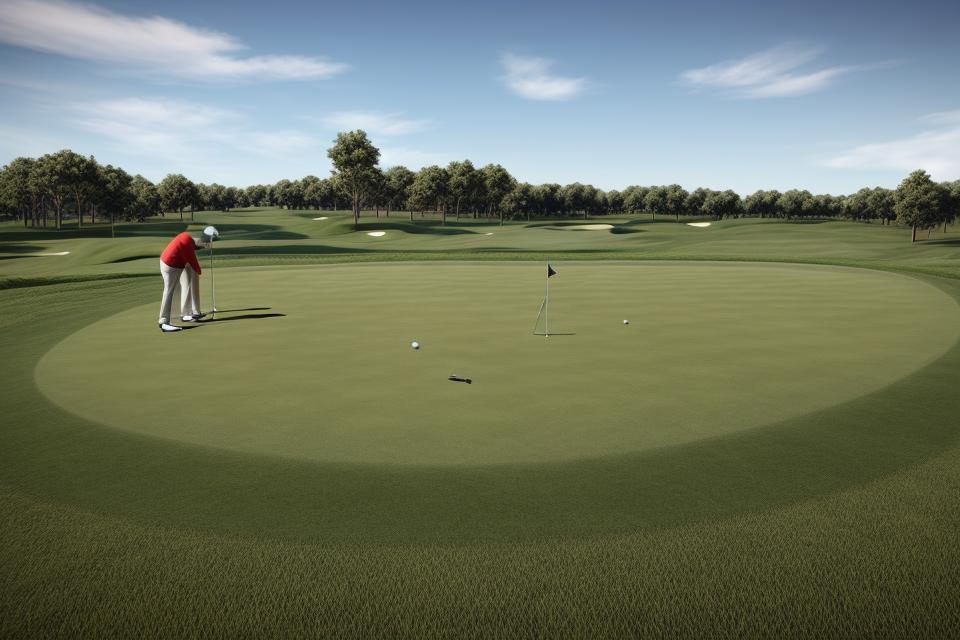
Golf is a game that requires precision and skill, and choosing the right club is crucial to making a successful shot. But can caddies really help you choose the right club? The answer is yes, caddies can offer valuable insights and recommendations based on their knowledge of the course and the player’s strengths and weaknesses. In this article, we will explore how caddies can assist golfers in selecting the appropriate club for each shot, and how their expertise can make a significant difference in a player’s performance on the course. So, if you’re looking to improve your game, read on to discover how a caddy can be your secret weapon on the green.
Yes, caddies can really help you choose the right club. Caddies are trained to know the golf course and can provide valuable advice on which club to use for a particular shot. They can also help with club selection based on factors such as wind conditions, green speed, and hole distance. Having a caddy can be especially helpful for golfers who are new to a course or who are struggling with their shot selection. Additionally, caddies can provide other helpful services such as carrying golf bags, providing yardage information, and cleaning golf clubs.
The Role of a Caddy in Golf Club Selection
Understanding the Responsibilities of a Caddy
A caddy is an essential part of a golfer’s team, responsible for carrying the golfer’s bag and providing various forms of assistance during a round of golf. One of the primary responsibilities of a caddy is to advise the golfer on the selection of the appropriate golf club for each shot. This article will explore the role of a caddy in golf club selection and how they contribute to the process.
Advising on Club Selection
The selection of the right golf club is crucial in golf, as it can significantly impact the golfer’s performance and ultimately determine the outcome of the game. A caddy plays a vital role in advising the golfer on the best club to use for each shot, taking into account factors such as the distance to the hole, the wind conditions, and the lie of the ball.
Caddies are well-versed in the characteristics of different golf clubs and can provide valuable insights into the optimal club to use for each shot. They can also provide guidance on the appropriate technique to use when swinging the club, such as the optimal ball position or the ideal swing speed.
However, it is important to note that the caddy’s advice is not always definitive, and the final decision on which club to use rests with the golfer. The golfer must ultimately assess the situation and determine which club will provide the best outcome for their shot.
Carrying and Managing Clubs
In addition to advising on club selection, a caddy also has the responsibility of carrying and managing the golfer’s clubs during a round of golf. This involves carrying the bag containing the clubs, as well as ensuring that the clubs are in good condition and that the golfer has access to the clubs they need for each shot.
Carrying clubs can be physically demanding, requiring the caddy to walk long distances over varied terrain, including hills, valleys, and uneven surfaces. It can also be mentally demanding, as the caddy must constantly be aware of the golfer’s needs and ensure that they have access to the appropriate clubs at all times.
Overall, the responsibilities of a caddy in golf club selection are significant, and they play a critical role in helping golfers make informed decisions about which clubs to use for each shot. While their advice can be invaluable, it is ultimately up to the golfer to make the final decision on which club to use.
The Skills and Knowledge Required of a Caddy
A caddy’s role in golf club selection is multifaceted and requires a specific set of skills and knowledge. In order to assist a golfer in choosing the right club, a caddy must possess a deep understanding of the game, the golf course, and the golfer’s own swing and ball flight.
Golf Course Knowledge
A caddy’s familiarity with the golf course layout is crucial in helping a golfer choose the right club. They must know the length and configuration of each hole, as well as any hazards or other features that could impact the golfer’s shot selection. In addition, a caddy must be familiar with the hole characteristics, such as the shape and size of the green, as well as any slope or undulation that could affect the trajectory of the ball.
Familiarity with the Course Layout
A caddy must have a thorough knowledge of the golf course layout, including the location of hazards, bunkers, and other features that could impact the golfer’s shot selection. They must also be familiar with the distance between the tee and the green, as well as any other relevant landmarks or features that could affect the golfer’s shot.
Knowledge of Hole Characteristics
In addition to the course layout, a caddy must also have a deep understanding of the hole characteristics. This includes the shape and size of the green, as well as any slope or undulation that could affect the trajectory of the ball. A caddy must also be familiar with the location of the hole’s flag, as well as any other features that could impact the golfer’s shot selection.
Understanding of Wind and Weather Conditions
A caddy must also be aware of the wind and weather conditions, as these can have a significant impact on the golfer’s shot selection. They must be able to advise the golfer on how to adjust their shot to account for the wind, as well as any other weather-related factors that could affect the ball’s trajectory.
Club Selection and Strategy
In addition to their knowledge of the golf course and weather conditions, a caddy must also have a deep understanding of club selection and strategy. This includes an understanding of the golfer’s swing and ball flight, as well as knowledge of club technologies and design.
Understanding the Golfer’s Swing and Ball Flight
A caddy must be able to observe the golfer’s swing and ball flight in order to make informed recommendations about club selection. They must be able to identify any weaknesses or inconsistencies in the golfer’s swing, as well as any tendencies that could impact their shot selection.
Knowledge of Club Technologies and Design
A caddy must also have a deep understanding of club technologies and design, in order to make informed recommendations about club selection. This includes knowledge of the different types of clubs available, as well as their specific features and capabilities. A caddy must also be able to assess the golfer’s own clubs, in order to determine whether they are well-suited to the golfer’s swing and playing style.
Ability to Analyze the Shot Requirements
Finally, a caddy must have the ability to analyze the shot requirements for each hole, in order to make informed recommendations about club selection. This includes an understanding of the distance and trajectory required for each shot, as well as any other factors that could impact the golfer‘s shot selection. A caddy must be able to take all of these factors into account, in order to help the golfer choose the right club for each shot.
The Impact of Caddy Experience and Quality
The Role of Experience in Caddy Performance
Golf is a sport that requires a high level of skill and precision, and selecting the right club is crucial to achieving a successful shot. While some golfers prefer to make their own club selection decisions, others rely on the expertise of their caddy to help them choose the best club for each shot.
Gaining experience and building expertise are key factors in a caddy’s ability to help a golfer select the right club. A caddy who has worked on a golf course for many years, for example, will have a deep understanding of the course’s layout, the challenges posed by each hole, and the best strategies for navigating those challenges. They will also have developed a keen eye for spotting the subtlest variations in a golfer’s swing or stance that could indicate the need for a particular club.
Gaining Experience and Building Expertise
A caddy’s experience is crucial in helping them understand the game of golf and the challenges posed by different holes. Through years of working on a golf course, a caddy will have gained a deep understanding of the course’s layout, the best strategies for navigating each hole, and the nuances of the game.
A caddy’s experience also allows them to develop a keen eye for spotting the subtlest variations in a golfer’s swing or stance that could indicate the need for a particular club. This ability to observe and interpret subtle changes in a golfer’s game is a skill that comes only with experience.
The Impact of Experience on Club Selection
A caddy’s experience can have a significant impact on a golfer’s ability to select the right club for each shot. For example, a caddy who has worked on a golf course for many years will have a deep understanding of the course’s layout, the challenges posed by each hole, and the best strategies for navigating those challenges. They will also have developed a keen eye for spotting the subtlest variations in a golfer’s swing or stance that could indicate the need for a particular club.
With this knowledge and expertise, a caddy can help a golfer make informed decisions about club selection, ultimately leading to more successful shots and a better overall golfing experience.
The Quality of Caddy Service
In addition to experience, the quality of a caddy’s service is also an important factor in their ability to help a golfer choose the right club. The quality of a caddy’s service can be affected by a variety of factors, including their level of professionalism, their attentiveness to the golfer’s needs, and their ability to communicate effectively.
Factors Affecting Caddy Quality
The quality of a caddy’s service can be affected by a variety of factors, including their level of professionalism, their attentiveness to the golfer’s needs, and their ability to communicate effectively. For example, a caddy who is professional and courteous in their interactions with the golfer will be more likely to build trust and establish a positive working relationship. Similarly, a caddy who is attentive to the golfer’s needs, such as by anticipating their requests or offering advice based on their strengths and weaknesses, will be more likely to provide high-quality service.
The Importance of Consistency in Caddy Performance
Consistency is also an important factor in the quality of a caddy’s service. A caddy who is consistently professional, attentive, and effective in their communication will be more likely to provide high-quality service on a regular basis. This consistency is especially important for golfers who rely on their caddy’s expertise to help them choose the right club for each shot.
Evaluating Caddy Performance
Assessing Caddy Skills and Knowledge
Observation and Feedback
- The Importance of Communication: A caddy’s ability to communicate effectively with their golfer is crucial in ensuring that they are able to make the right club selection. Good communication enables the golfer to provide necessary information about their swing, strengths, weaknesses, and preferences, while the caddy can offer advice and guidance based on their knowledge and experience.
- The Benefits of Constructive Feedback: Constructive feedback is essential in helping golfers improve their game. A caddy who provides specific, actionable feedback can help a golfer make adjustments to their swing or choice of club, leading to better shot outcomes. Feedback should be given in a supportive and non-judgmental manner, focusing on the task at hand rather than on the golfer’s shortcomings.
Assessing Performance Metrics
- Measuring Club Selection Accuracy: One way to assess a caddy’s skills and knowledge is by measuring their club selection accuracy. This can be done by comparing the golfer’s actual shot outcomes with the expected outcomes based on the club selected. A caddy who consistently makes accurate club recommendations is likely to have a positive impact on the golfer’s performance.
- Analyzing the Impact on Shot Outcomes: Another way to evaluate a caddy’s performance is by analyzing the impact of their club recommendations on the golfer’s shot outcomes. This can be done by comparing the golfer’s performance with and without the caddy’s assistance. A caddy who is able to significantly improve the golfer’s shot outcomes is likely to be providing valuable assistance.
The Role of Technology in Caddy Evaluation
Technology for Monitoring Performance
GPS tracking and distance measurement technologies have revolutionized the way caddies assess a golfer’s performance. These tools allow caddies to gather data on a player’s driving distance, accuracy, and trajectory, enabling them to make more informed decisions about club selection. In addition, video analysis and swing evaluation software can provide valuable insights into a golfer’s technique, helping caddies to identify areas for improvement and fine-tune their recommendations.
Technology for Improving Caddy Performance
In addition to monitoring a golfer’s performance, technology can also be used to improve a caddy’s skills and knowledge. Training and education tools, such as online courses and simulation software, can help caddies hone their skills and stay up-to-date on the latest developments in golf technology and strategy. Performance feedback and coaching tools can also help caddies to identify areas for improvement and develop effective strategies for working with golfers of all skill levels.
Overall, technology has greatly enhanced the ability of caddies to evaluate and improve their performance, providing them with the tools and insights they need to help golfers achieve their full potential on the course.
The Value of Caddy Assistance in Club Selection
The Benefits of Using a Caddy
- Time Savings and Reduced Stress: With a caddy’s assistance, golfers can save time in selecting the appropriate club for each shot, reducing the mental strain associated with making such decisions.
- Improved Shot Selection and Outcomes: A caddy’s expertise in club selection can lead to better shot choices, which in turn can improve the golfer’s overall performance and shot outcomes.
The Limitations of Caddy Assistance
- The Impact of Personal Preferences and Styles: Caddies may not always take into account a golfer’s personal preferences or playing styles, which can limit the effectiveness of their assistance.
- The Importance of Golfer Input and Decision-Making: While caddies can provide valuable guidance, golfers ultimately need to make their own decisions and take responsibility for their shots. The role of a caddy is to support and inform, rather than to dictate or replace the golfer’s decision-making process.
FAQs
1. What is the role of a caddy in golf?
A caddy in golf is responsible for carrying a golfer’s bag, providing advice on club selection, reading greens, and offering general assistance during a round of golf. Caddies are often experienced golfers themselves and have a deep understanding of the game, course strategy, and equipment.
2. How do caddies determine which club to use in a given situation?
Caddies determine which club to use in a given situation by assessing factors such as distance to the hole, wind conditions, terrain, and the golfer’s personal swing and shot preferences. They also consider the type of shot the golfer is trying to hit (e.g., straight, draw, or fade) and the overall strategy for the hole.
3. Can a caddy make a difference in a golfer’s performance?
Yes, a caddy can make a significant difference in a golfer’s performance by providing expert advice on club selection, helping with course strategy, and offering support during a round. A caddy’s local knowledge of a course, including its quirks and hazards, can be invaluable to a golfer.
4. What are the benefits of using a caddy?
The benefits of using a caddy include improved shot selection, better course management, reduced stress, and more enjoyment from the game. A caddy can help golfers make more informed decisions, allowing them to focus on their swing and the overall experience of playing golf.
5. Are caddies only useful for experienced golfers?
No, caddies can be beneficial for golfers of all skill levels, from beginners to professionals. While experienced golfers may have more specific preferences and strategies, caddies can still provide valuable assistance with club selection, reading greens, and general course knowledge. Beginner golfers may particularly benefit from a caddy’s guidance in understanding the game and developing good habits.
6. How do you communicate with a caddy during a round?
Communication with a caddy during a round typically involves calling out club choices and discussing strategy for each shot. Golfers can also ask for advice on reading greens, course management, and any other questions they may have. Effective communication is key to getting the most out of a caddy’s expertise.
7. How much should you tip a caddy after a round?
Tipping etiquette for caddies varies, but a general guideline is to tip 15-20% of the total green fee. Some golf courses include a mandatory gratuity in the green fee, so it’s essential to check for any service charges before deciding on a tip.
8. Can you use a caddy if you don’t have one provided by the golf course?
Yes, you can hire a caddy independently if the golf course does not provide them. You can usually find caddy services through the golf course, local golf shops, or online platforms. Just make sure to arrange for a caddy in advance to ensure they are available for your desired tee time.


